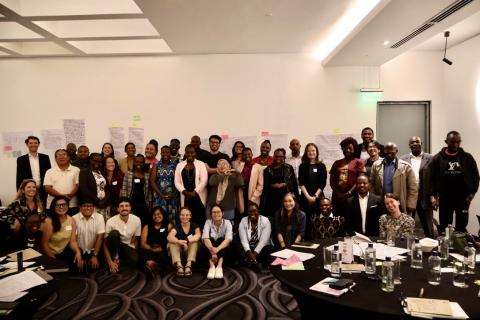Inclusive conversations: Pioneering a human rights-based approach to biodiversity and climate action
Inclusive conversations: Pioneering a human rights-based approach to biodiversity and climate action
CDKN is co-convening a dialogue series on pioneering a human-rights based approach (HRBA) to biodiversity and climate action together with BES-Net, Swedbio, Soka Gakkai International and the Forest, Climate, and Livelihood research network (Focali). Three inclusive conversations are being held in May and June that are designed to coincide with major global conferences on limiting biodiversity loss and addressing climate change.
The first dialogue in the series was held from 19-20 May and ran alongside the Convention on Biological Diversity’s SBSTTA 26 and SBI 4 in Nairobi, Kenya. The next two will be held at the same time as the UNFCCC SB60 in Bonn, Germany, and NBSI Conference in Oxford, UK, both in June. The dialogues are supported by the Convention on Biological Diversity (CBD) secretariat and the United Nations Human Rights Office of the High Commissioner.
The dialogues aim to improve efforts to deal with the existing gap between internationally agreed frameworks and implementing these frameworks at the national and subnational levels. The series supports CDKN’s work of enhancing just, equitable and socially inclusive ecosystem-based adaptation in research, policy and practice by mobilising and strengthening capacity around the global biodiversity conservation agenda. Throughout this series, CDKN will convene multi-actor dialogues and look for strategic entry points that can catalyse action.
The two major global agreements on climate change (the Paris Agreement) and biodiversity (the Kunming-Montreal Global Biodiversity Framework (KMGBF)) both recognise the need to respect and protect human rights. The adoption of the KMGBF in particular requires HRBA to be implemented in a way that identifies power dynamics, inequalities and discrimination, while also providing transparency and accountability through monitoring, evaluation and reporting. The dialogue series process aims to enhance understanding and strengthen the capacity of the various actors who are working and can work to implement HRBA for biodiversity and climate action.

Each of the three dialogues will be conducted with a different combination of stakeholders, taking into account the asymmetric power issues that exist among diverse knowledge systems. The focus of the first workshop was on amplifying the voices of Indigenous Peoples, local communities, women and youth and exploring examples of how HRBA can be implemented on the ground. The objective is to incorporate these groups’ perspectives and knowledge into biodiversity and climate action strategies and thereby ensure that their voices, concerns and strategies are heard in the process.
The second workshop will be held on the sidelines of the UNFCCC SB60 and will foster collaboration and conversation between member states. Through sharing best practices, and identifying common challenges and opportunities around a HRBA, the aim is for participants to explore how best to integrate globally-recognised human rights principles into national and international biodiversity and climate policies.
The third workshop will bring together members of the research community and international non-governmental organisations. They will explore best practice around integrating scientific research and advocacy to encourage the application of a HRBA to biodiversity and climate action. They will work to bridge the gap between academic research and its practical implementation, ensuring that scientific insights and evidence-based strategies can inform policy and action plans.
Later in the year, CDKN will co-convene a further online workshop (in September) as well as a multi-actor dialogue seminar that will be held just prior to CBD’s COP16.
